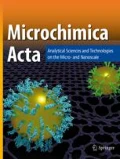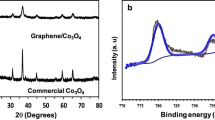Abstract
A nanocomposite was prepared from gold and graphene oxide via one-step electrodeposition and used to modify the surface of a gold electrode (Au-Gr/GE) that was then applied to non-enzymatic determination of glucose. The effects of deposition time and supporting substrate on the morphology, structure, and electrochemical properties of the nanocomposite were optimized. The morphologies and crystal structures were characterized by scanning electron microscopy, transmission electron microscopy, and X-ray diffraction. The results indicate that gold nanoparticles grew on the surface of two-dimensional graphene oxide. The electrocatalytic activity of the modified electrode towards glucose oxidation was evaluated by cyclic voltammetry and amperometric methods at pH 7.4. The Au-Gr/GE, typically operated at a potential of 0.00 V (vs. Ag/AgCl), has a linear response in the 0.05–14 mM and 14–42 mM glucose concentration range, high sensitivity (604 and 267 μA cm−2 mM−1) and a low detection limit (12 μM). The modified GE was applied to quantify glucose in sweat where it exhibited excellent sensitivity and accuracy.

The gold electrode modified with a gold-graphene (Au-Gr/GE) is prepared via a direct electrodeposition. The Au-Gr/GE is used for glucose detection in the neutral solution and it can achieve the effect of non-intrusive detection.





Similar content being viewed by others
References
Nantaphol S, Watanabe T, Nomura N, Siangproh W, Chailapakul O, Einaga Y (2017) Bimetallic Pt-Au nanocatalysts electrochemically deposited on boron-doped diamond electrodes for nonenzymatic glucose detection. Biosens Bioelectron 98:76–82. https://doi.org/10.1016/j.bios.2017.06.034
Li J, Yuan R, Chai Y, Che X, Li W, Zhong X (2010) Nonenzymatic glucose sensor based on a glassy carbon electrode modified with chains of platinum hollow nanoparticles and porous gold nanoparticles in a chitosan membrane. Microchim Acta 172(1–2):163–169. https://doi.org/10.1007/s00604-010-0485-z
Monosik R, Stredansky M, Luspai K, Magdolen P, Sturdik E (2012) Amperometric glucose biosensor utilizing FAD-dependent glucose dehydrogenase immobilized on nanocomposite electrode. Enzym Microb Technol 50(4–5):227–232. https://doi.org/10.1016/j.enzmictec.2012.01.004
Zhao Y, Chu J, Li S-H, Li W-W, Liu G, Tian Y-C, Yu H-Q (2014) Non-enzymatic electrochemical detection of glucose with a gold nanowire array electrode. Electroanalysis 26(3):656–663. https://doi.org/10.1002/elan.201300565
Wang L, Zhu W, Lu W, Qin X, Xu X (2018) Surface plasmon aided high sensitive non-enzymatic glucose sensor using Au/NiAu multilayered nanowire arrays. Biosens Bioelectron 111:41–46. https://doi.org/10.1016/j.bios.2018.03.067
Guo MQ, Hong HS, Tang XN, Fang HD, Xu XH (2012) Ultrasonic electrodeposition of platinum nanoflowers and their application in nonenzymatic glucose sensors. Electrochim Acta 63:1–8. https://doi.org/10.1016/j.electacta.2011.11.114
Lu LM, Zhang L, Qu FL, Lu HX, Zhang XB, Wu ZS, Huan SY, Wang QA, Shen GL, Yu RQ (2009) A nano-Ni based ultrasensitive nonenzymatic electrochemical sensor for glucose: enhancing sensitivity through a nanowire array strategy. Biosens Bioelectron 25(1):218–223. https://doi.org/10.1016/j.bios.2009.06.041
Luo P, Zhang F, Baldwin RP (1991) Comparison of metallic electrodes for constant-potential amperometric detection of carbohydrates, amino acids and related compounds in flow systems. Anal Chim Acta 244(2):169–178
Dhara K, Mahapatra DR (2017) Electrochemical nonenzymatic sensing of glucose using advanced nanomaterials. Microchim Acta 185(1):49. https://doi.org/10.1007/s00604-017-2609-1
Wang H, Liu R, Li Y, Lü X, Wang Q, Zhao S, Yuan K, Cui Z, Li X, Xin S, Zhang R, Lei M, Lin Z (2018) Durable and efficient hollow porous oxide spinel microspheres for oxygen reduction. Joule 2(2):337–348. https://doi.org/10.1016/j.joule.2017.11.016
He X, Luan SZ, Wang L, Wang RY, Du P, Xu YY, Yang HJ, Wang YG, Huang K, Lei M (2019) Facile loading mesoporous Co3O4 on nitrogen doped carbon matrix as an enhanced oxygen electrode catalyst. Mater Lett 244:78–82. https://doi.org/10.1016/j.matlet.2019.01.144
Cherevko S, Chung CH (2010) The porous CuO electrode fabricated by hydrogen bubble evolution and its application to highly sensitive non-enzymatic glucose detection. Talanta 80(3):1371–1377. https://doi.org/10.1016/j.talanta.2009.09.038
Yang J, Yu JH, Rudi Strickler J, Chang WJ, Gunasekaran S (2013) Nickel nanoparticle-chitosan-reduced graphene oxide-modified screen-printed electrodes for enzyme-free glucose sensing in portable microfluidic devices. Biosens Bioelectron 47:530–538. https://doi.org/10.1016/j.bios.2013.03.051
Bi K, Bi M, Hao Y, Luo W, Cai Z, Wang X, Huang Y (2018) Ultrafine core-shell BaTiO3@SiO2 structures for nanocomposite capacitors with high energy density. Nano Energy 51:513–523. https://doi.org/10.1016/j.nanoen.2018.07.006
Bi K, Wang X, Hao Y, Lei M, Dong G, Zhou J (2019) Wideband slot-coupled dielectric resonator-based filter. J Alloys Compd 785:1264–1269. https://doi.org/10.1016/j.jallcom.2019.01.286
Cheng TM, Huang TK, Lin HK, Tung SP, Chen YL, Lee CY, Chiu HT (2010) (110)-exposed gold nanocoral electrode as low onset potential selective glucose sensor. ACS Appl Mater Interfaces 2(10):2773–2780. https://doi.org/10.1021/am100432a
Wang C-H, Song Y-Y, Zhao J-W, Xia X-H (2006) Semiconductor supported biomimetic superhydrophobic gold surfaces by the galvanic exchange reaction. Surf Sci 600(4):38–42. https://doi.org/10.1016/j.susc.2005.12.013
Okutucu B, Onal S (2011) Molecularly imprinted polymers for separation of various sugars from human urine. Talanta 87:74–79. https://doi.org/10.1016/j.talanta.2011.09.043
Makaram P, Owens D, Aceros J (2014) Trends in nanomaterial-based non-invasive diabetes sensing technologies. Diagnostics 4(2):27–46. https://doi.org/10.3390/diagnostics4020027
Kaufman E, Lamster IB (2016) The diagnostic applications of saliva— a review. Crit Rev Oral Biol Med 13(2):197–212. https://doi.org/10.1177/154411130201300209
Olarte O, Chilo J, Pelegri-Sebastia J, Barbe K Glucose detection in human sweat using an electronic nose. In: Engineering in Medicine and Biology Society, 2013. pp 1462–1465
Moyer J, Wilson D, Finkelshtein I, Wong B, Potts R (2012) Correlation between sweat glucose and blood glucose in subjects with diabetes. Diabetes Technol Ther 14(5):398–402. https://doi.org/10.1089/dia.2011.0262
Shu H, Cao L, Chang G, He H, Zhang Y, He Y (2014) Direct electrodeposition of gold nanostructures onto glassy carbon electrodes for non-enzymatic detection of glucose. Electrochim Acta 132:524–532. https://doi.org/10.1016/j.electacta.2014.04.031
Xiao G, He J, Chen X, Qiao Y, Wang F, Xia Q, Yu L, Lu Z (2019) A wearable, cotton thread/paper-based microfluidic device coupled with smartphone for sweat glucose sensing. Cellulose 26(7):4553–4562. https://doi.org/10.1007/s10570-019-02396-y
Shu H, Chang G, Su J, Cao L, Huang Q, Zhang Y, Xia T, He Y (2015) Single-step electrochemical deposition of high performance Au-graphene nanocomposites for nonenzymatic glucose sensing. Sensors Actuators B Chem 220:331–339. https://doi.org/10.1016/j.snb.2015.05.094
Aoun SB, Dursun Z, Koga T, Bang GS, Sotomura T, Taniguchi I (2004) Effect of metal ad-layers on Au(111) electrodes on electrocatalytic oxidation of glucose in an alkaline solution. J Electroanal Chem 567(2):175–183. https://doi.org/10.1016/j.jelechem.2003.12.022
Tominaga M, Shimazoe T, Nagashima M, Taniguchi I (2005) Electrocatalytic oxidation of glucose at gold nanoparticle-modified carbon electrodes in alkaline and neutral solutions. Electrochem Commun 7(2):189–193. https://doi.org/10.1016/j.elecom.2004.12.006
Chang G, Shu H, Ji K, Oyama M, Liu X, He Y (2014) Gold nanoparticles directly modified glassy carbon electrode for non-enzymatic detection of glucose. Appl Surf Sci 288:524–529. https://doi.org/10.1016/j.apsusc.2013.10.064
Yang H, Geng L, Zhang Y, Chang G, Zhang Z, Liu X, Lei M, He Y (2019) Graphene-templated synthesis of palladium nanoplates as novel electrocatalyst for direct methanol fuel cell. Appl Surf Sci 466:385–392. https://doi.org/10.1016/j.apsusc.2018.10.050
Chen XM, Lin ZJ, Chen DJ, Jia TT, Cai ZM, Wang XR, Chen X, Chen GN, Oyama M (2010) Nonenzymatic amperometric sensing of glucose by using palladium nanoparticles supported on functional carbon nanotubes. Biosens Bioelectron 25(7):1803–1808. https://doi.org/10.1016/j.bios.2009.12.035
Hrapovic S, Liu Y, Male KB, Luong JH (2004) Electrochemical biosensing platforms using platinum nanoparticles and carbon nanotubes. Anal Chem 76(4):1083–1088
Zhou Y-G, Yang S, Qian Q-Y, Xia X-H (2009) Gold nanoparticles integrated in a nanotube array for electrochemical detection of glucose. Electrochem Commun 11(1):216–219. https://doi.org/10.1016/j.elecom.2008.11.010
Su L, Feng J, Zhou X, Ren C, Li H, Chen X (2012) Colorimetric detection of urine glucose based ZnFe2O4 magnetic nanoparticles. Anal Chem 84(13):5753–5758. https://doi.org/10.1021/ac300939z
Xia Y, Huang W, Zheng J, Niu Z, Li Z (2011) Nonenzymatic amperometric response of glucose on a nanoporous gold film electrode fabricated by a rapid and simple electrochemical method. Biosens Bioelectron 26(8):3555–3561. https://doi.org/10.1016/j.bios.2011.01.044
Xu F, Cui K, Sun Y, Guo C, Liu Z, Zhang Y, Shi Y, Li Z (2010) Facile synthesis of urchin-like gold submicrostructures for nonenzymatic glucose sensing. Talanta 82(5):1845–1852. https://doi.org/10.1016/j.talanta.2010.07.087
Lee Y-J, Park J-Y (2011) A coral-like macroporous gold–platinum hybrid 3D electrode for enzyme-free glucose detection. Sensors Actuators B Chem 155(1):134–139. https://doi.org/10.1016/j.snb.2010.11.037
Cherevko S, Chung C-H (2009) Gold nanowire array electrode for non-enzymatic voltammetric and amperometric glucose detection. Sensors Actuators B Chem 142(1):216–223. https://doi.org/10.1016/j.snb.2009.07.023
Rakhi RB, Sethupathi K, Ramaprabhu S (2009) A glucose biosensor based on deposition of glucose oxidase onto crystalline gold nanoparticle modified carbon nanotube electrode. J Phys Chem B 113(10):3190–3194
Acknowledgements
The authors acknowledge the financial support from the NSFC (Nos. 21575035, 51572073, 51672074, 11774082), the NSF of Hubei Province (Nos. 2015CFA119, 2016AAA031), Wuhan application foundation frontier Project (No. 2018010401011287), and the Key Lab. of Tobacco Chemistry Foundation of Yunnan Province (No. 2016539200340109).
Author information
Authors and Affiliations
Corresponding authors
Ethics declarations
Conflict of interest
The authors certify that there is no conflict of interest with any individual/organization for the present work.
Additional information
Publisher’s note
Springer Nature remains neutral with regard to jurisdictional claims in published maps and institutional affiliations.
Electronic supplementary material
ESM 1
(DOCX 1168 kb)
Rights and permissions
About this article
Cite this article
He, C., Wang, J., Gao, N. et al. A gold electrode modified with a gold-graphene oxide nanocomposite for non-enzymatic sensing of glucose at near-neutral pH values. Microchim Acta 186, 722 (2019). https://doi.org/10.1007/s00604-019-3796-8
Received:
Accepted:
Published:
DOI: https://doi.org/10.1007/s00604-019-3796-8




